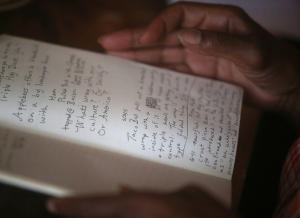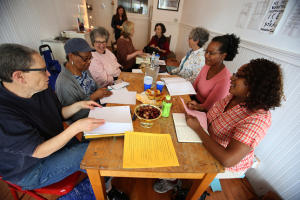Writing your story: the healing power of memoir-writing
When Michelle McAfee joined a memoir-writing project at Oakland's Temescal library, she was eager to recount tales about growing up African-American in mostly white central Contra Costa County in the 1970s.
Instead, prompts from the workshop's instructor pushed her into a slightly different and more emotionally raw direction. She summoned memories of her father, a retired Air Force major who died in 2013 after a three-year bout of dementia.
She found herself focusing on how he planted a Meyer lemon tree outside their Lafayette home. As she re-created that scene, building a narrative with a dramatic rise and fall, she found connections between the quiet, deliberate way he nurtured that tree, the person he was, and how much she still missed him. He had been their family's "Rock of Gibraltar," she wrote in her essay "Lemon Tree." When his health declined, "our lives crumbled with it, the lawn became spotted with brown patches ... and the lemon tree began to wither."
 Michelle McAfee looks through her notebook during a memoir writing meeting on Sunday, Oct. 18, 2015, in Oakland, Calif. (Aric Crabb/Bay Area News Group) ( ARIC CRABB )
Michelle McAfee looks through her notebook during a memoir writing meeting on Sunday, Oct. 18, 2015, in Oakland, Calif. (Aric Crabb/Bay Area News Group) ( ARIC CRABB )The process of writing the essay was a revelation and a relief, she says: "I realized he was weighing so heavily, but in a beautiful way, on my soul."
People have been sharing their life stories even before humans first started writing. Today, memoirs are among our most popular literary forms; ask around and you'll probably find a friend or relative who is working on their own memoir.
Have you heard about the Write Your Magic Program?
Use journaling to gain clarity in your life and to write your story.
Although some may aspire to become the next Frank McCourt, Cheryl Strayed or Mary Karr, many simply want to explore their lives and experiences, including those pivotal events that might have been difficult or even traumatic. Indeed, it is the confessional nature of memoirs that makes writing them a potentially powerful tool for emotional healing. A growing body of research demonstrates that taking pen to journal or fingers to keyboard can improve the physical and emotional health of people dealing with everything from ordinary turning points, such as leaving home for college, to serious misfortunes or major trauma, like childhood abuse, addiction, a death in the family or terminal illness.
This is true for professionals writing for publication and for people who've written nothing but business memos since high school or college English. It's also true for people who trash what they write or never show it to anyone else.
 Michelle McAfee, right, leads a memoir-writing meeting on Sunday, Oct. 18, 2015, in Oakland, Calif. (Aric Crabb/Bay Area News Group) ( ARIC CRABB )
Michelle McAfee, right, leads a memoir-writing meeting on Sunday, Oct. 18, 2015, in Oakland, Calif. (Aric Crabb/Bay Area News Group) ( ARIC CRABB )"When people are given the opportunity to write about emotional upheavals, they often experience improved health," says James Pennebaker, a psychologist at the University of Texas at Austin who has pioneered research on the healing power of what he calls "expressive" writing. "They go to the doctor less. They have changes in immune function. ... People will tell us months afterward that it's been a very beneficial experience for them."
Getting that riot of thoughts out of one's head and onto a page can be the first step to bringing order to a complicated experience and making it more manageable, Pennebaker says. Writing, he adds, helps people uncover further knowledge as they continue to write.
Joan Didion put it another way: "I write entirely to find out what I'm thinking, what I'm looking at, what I see and what it means. What I want and what I fear."
Writing helped San Francisco copywriter Robin Bruns Worona discover, while being treated for breast cancer over the past year, that "I was never having just one emotion at a time, but two or three or five or 20 emotions at once."
She and other writers interviewed for this story add that sharing their personal stories with other people pushed them to new levels of self-exploration and enhanced their understanding of difficult events.
After Wendy Donner, of San Anselmo, was diagnosed with breast cancer in 2014, she thought she'd pour her emotions into painting. But after she penned a blog post about her diagnosis and people responded, she decided to keep writing. Knowing people were rooting for her, she always tried to provide a positive framework for her wrenching accounts about the side effects of treatment or her fears about dying. "I would ask myself, what can I learn from this? I would sit down and write and figure it all out in the writing."
Bruns Worona and Donner have joined other members of Bay Area Young Survivors, a network of young cancer survivors, in publishing their stories in the new anthology, "Shivering in a Paper Gown." Meanwhile, McAfee's "Lemon Tree" is included in the new anthology "Subject to Change," published by members of her Temescal writing project.
Writers such as Donner, who started writing for herself and then began sharing her stories with a wide audience, need to work at crafting narratives that will keep readers wanting to turn the page. That means employing classic fiction techniques, says Linda Joy Myers, a Berkeley psychotherapist who teaches an online six-month memoir writing class with Brooke Warner, publisher of She Writes Press.
Using those techniques can also help with the healing process, Myers says.
"I tell people that the more they learn to create a real scene, the more they learn to taste, feel and see what happened, the more they will tell a better story for other people ... and the more they are going to heal themselves from the experience they're writing about," says Myers, who also published her own memoir, "Don't Call Me Mother: A Daughter's Journey from Abandonment to Forgiveness," and is president of the National Association of Memoir Writers.
Adds Frances Lefkowitz, the instructor for the Temescal writing project: "I would make the radical argument that what makes for good therapy makes for good art."
As with a productive therapy session, a compelling story also comes from incorporating other viewpoints or social or historical context, she explains. "In developing empathy for other characters in the story and seeing these experiences in a wider context, the memories become less self-indulgent and more universal," Lefkowitz says. "It also leads to a deeper understanding of one's own conflicts."
Because digging into life events can be "emotional" for some writers, they might want to work with a therapist or experienced writing coach, she and Myers say. At the very least, anyone writing about something particularly traumatic should limit how much time he or she devotes to that each day and alternate those sessions with writing about times when they felt happy, loved and supported.
The healing process continues as writers get editorial feedback and work on revisions. At this point, they may gain a healthy emotional distance from the experiences that once tormented them.
"The editing process took the pain out of it," says Bruns Worona, about the essay in which she recounts her anguish when a cherished necklace, given to her by her husband, went missing during her cancer treatment. "I remember how I felt when I first wrote it, but by the time I was revising the piece, it wasn't as painful as it was before."
Another sense of letting go comes after writers release their works into the world, in the form of a book, online essay or public reading. Often better than receiving praise for their beautiful prose is learning how their experiences touched readers, including those who have undergone similar hardships, the writers say.
"When you share your story, other people start to share their stories with you," says Bruns Worona. "Listening to some of the horrible things others have gone through, I'm not sure they would have told me otherwise. That's such a human thing. You form connections with people you never thought you'd have connections with."
- Write your memoir in six months: Classes, workshops and blog with writing tips from Brooke Warner, publisher of She Writes Press, and Linda Joy Myers, founder and president of the National Association of Memoir Writers. http://writeyourbookinsixmonths.com
- Community Memoir Project: www.communitymemoir.org. Read stories from writers at the Berkeley Public Library memoir project and Oakland's Tesmescal writers. The Temescal writers' anthology, "Subject to Change," is available at Sagrada Sacred Arts, 4926 Telegraph Ave., Oakland, and at Pegasus Books, 5560 College Ave., Oakland.
- "Shivering in a Paper Gown: Breast Cancer and its Aftermath," essays by Bay Area Young Survivors, is available at Amazon.
via Writing your story: the healing power of memoir-writing

